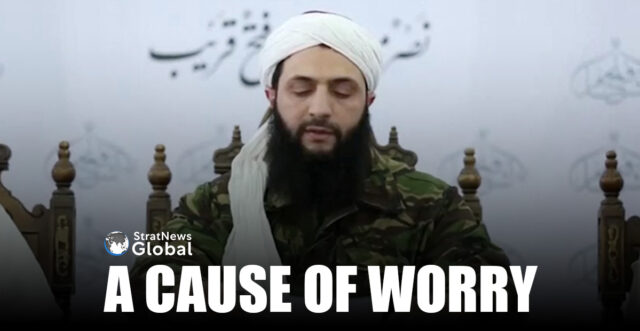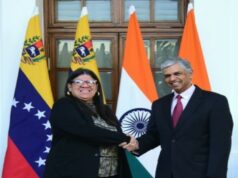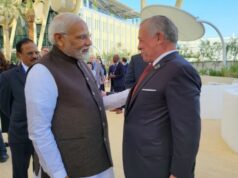India is being extra cautious in reacting to the unfolding developments in Syria following the recent ouster of its authoritarian President Bashar al-Assad.
Like the United States, India is deeply concerned over the threat of re emergence of ISIS in Syria.
The threat of radicalization, extremism and Jihad emanating from Syria looms large once again.
The mood in Syria following the end of Assad’s brutal dictatorship and the end of the 53 year- long Assad dynasty is celebratory but Indian intelligence agencies are worried about what they have to handle next.
They are concerned that the rise of Hayat Tahrir al-Sham which is now controlling Syria, will revive the ideas of violent jihad.
Analysts say that the moot point is that the rebel fighters who declared Damascus liberated in a video statement on State television, have dubious antecedents.
The reasons for this threat perception are not far to seek.
Syria is now in control of militant group HTS (Hayat Tahrir-al Sham) which was once affiliated with Al-Qaeda.
The HTS is a new rebel coalition, led by Abu Mohammad -Al-Golani whose real name is Ahmed al-Sharaa.
The HTS de facto leader Abu Mohammad -Al-Golani broke off with Al Qaeda in 2016 but that cannot erase his past, says Delhi based West Asia expert, Md. Muddassir Quamar.
After announcing a split from Al Qaeda in 2016, Golani created a Syria-focused anti-regime front with other local faction.
He named this Jabhat Fateh al-Sham (the Front for the Conquest of the Levant), which later changed to Hayat Tahrir Al Sham (HTS), or the Organization for the Liberation of the Levant.
Notably, the US, Turkey, the United Nations and several other western countries continue to designate HTS as a Foreign Terrorist Organization.
In 2018, the United States designated HTS as a Foreign Terrorist Organization in 2018 and also placed a $10 million bounty on Golani.
“Let us not forget that Golani who claims to have severed links with Al-Qaeda in 2016, has worked very closely with Abu Bakr al-Baghdadi in Iraq, ‘’ says Quamar, Associate Professor, West Asian Studies in Jawaharlal Nehru University.
“Golani’s past with Al-Qaeda would make anybody sceptical. That is why most countries including those in Europe, the Gulf and India are sceptical about reacting to the situation.’’
The JNU scholar has a valid point.
After all, a leopard never changes its spots.
Quamar said that these countries feel that Syria’s integrity should not be compromised.
He said that it was Baghdadi who sent Golani in 2012 to Syria to start a group to fight the Assad government.
Golani’s credentials therefore do not inspire the confidence of India that has suffered terrorism for a long time and flagged the issue of terrorism in UN nearly three decades ago.
To a question on the HTS link with Al-Qaeda, Muddassir said, “HTS Al-Qaeda baggage is something nobody can dismiss.”
“This is something that will always be on the back of our minds,” Muddassir said in an exclusive interview with StratNews Global.
Muddassir recognizes why the United States has warned that the Islamic State will try to re establish in Syria.
After the Assad regime was toppled on December 8, US Secretary of State, Antony Blinken warned that ISIS will try to use this period to re-establish its capabilities, to create safe havens.
The fact is that the physical distance of 4000 kilometer between New Delhi and Damascus matters little in an online world exploited to the hilt to spread Jihad and cultivate Jihadis on Indian soil.
Muddassir said that when the IS was active in Iraq and Syria between 2014 and 2016, Indian intelligence and security agencies cracked many cases where Indians were being indoctrinated online.
These were young Indian men and women- doctors, engineers and IT professionals from Bihar, Karnataka, Kerala, Maharashtra, Uttar Pradesh and West Bengal.
In fact, there were a number of Indian fighters who joined the ranks of ISIS during this period in Iraq and Syria.
The number of Indians who were radicalized during this time, ran into three digits.
He went on to suggest that Indian intelligence agencies will have to be in a state of high alert to detect any kind of activity following the emergence of a government controlled by HTS.
“What is of utmost concern to India is the threat of radicalization, terrorism and Jihad emanating from Syria.’’, the JNU Associate Professor said.
He reiterated that there is need for utmost caution.
From time to time, the National Investigation Agency has busted IS sleeper cells in Bihar, Delhi and Uttar Pradesh
The IS has made attempts to set up a branch in Jammu and Kashmir, he said.
Asked if India will discuss the situation in Syria with United States, Md. Muddassir said, “ We already have an established bilateral mechanism on counter terrorism engagement with Iran, Israel, Saudi Arabia, UAE and US.’’
He did not rule out the possibility of a discussion to ensure that proper preventive measures are in place.
The academician went on to say that Syria is in complete shambles and rebuilding it will not be easy.”What will happen there next is a million dollar question. The possibility of India offering a helping hand to Syria would depend on the evolving political situation.”
To a question on how India would aid much needed reconstruction of Syria, he said. “ There might be some aid forthcoming from India as and when the situation there stabilizes. Right now, we are in a wait and watch situation.”
He drew attention to the damage and destruction that Syria suffered during the 13 year long civil war.
“During the civil war, nearly seven million Syrians were displaced and at least 50 per cent became refugees in neighboring countries and Europe.”
A majority of Syrians took refuge in Turkey. At one point, there were about 2.5 million Syrians in Turkey followed by Germany.
India and Syria have had very good relations.
“India has no political or outstanding issues with Syria.’’
A lot of MoUs and agreements were signed between India and Syria but nothing materialized due to the civil war.
“We will have to wait for a while for business to be as usual between the two countries.’’
Replying to a question on the fallout of the crisis in Syria, he said, “If Syria is not stable and implodes like what happened in Iraq between 2005 and 2010, there was a sectarian civil war between Shias and Sunnis.”
“The point being, the implications would be as bad.”
He said that Israel, the Palestinian territories, Lebanon, Jordan, Turkey and to some extent even Egypt will get affected,” he said.
He added that even Iraq and the GCC (Gulf Cooperation Council) countries will get affected.
The IMEC (India-Middle East Europe Economic Corridor) will get affected.
“It has to pass through the mediterranean, another few years would be lost. And if it spreads to the Gulf, it becomes more problematic.”
The JNU academician said that the kind of engagement that India has with the Gulf is very extensive.
India will face enormous political and strategic challenges if the mediterranean is not stable.
On the issue of India pulling out its nationals, he said, India has always been proactive in evacuating its nationals from conflict zones and during COVID from across the world.
The number of Indian citizens in Syria, compared to other countries in the region in the Middle East is a little over 90.
India has already ensured the safe return of its 75 nationals including 44 pilgrims from Syria.
Delhi based journalist pickled in journalism. Have reported from nine world capitals and almost all parts of India. Over the last three decades, I have worked for India’s mainstream English dailies and contributed to All India Radio, Doordarshan and Women’s Feature Service. Also worked for international media including Japan’s leading newspaper, The Asahi Shimbun and done assignments for The Sunday Times, London, The Telegraph, The Guardian and the Canadian Broadcasting Corporation. Worked in the Embassy of France in New Delhi and can speak French to save my life. Write on Diplomacy, Politics and the social sector. Love Nature, heritage, Nature, animals and vintage cars. Enjoy cycling and playing badminton.





